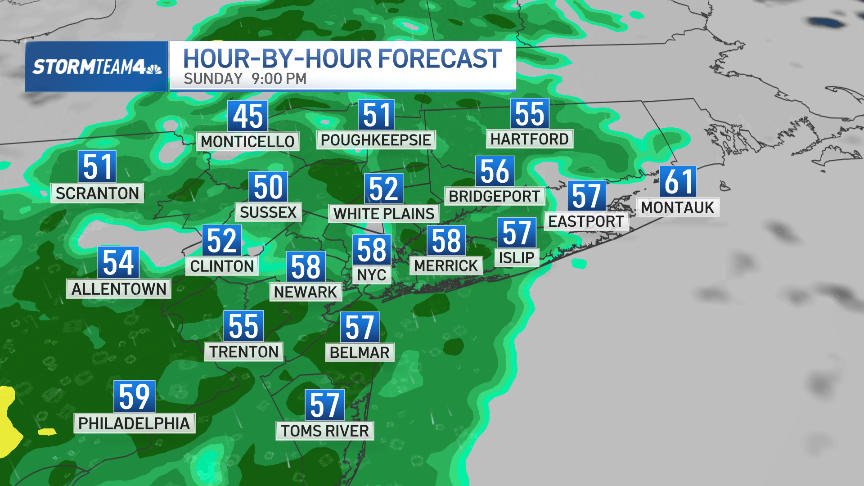New York City's only Republican congressional district could fall in November if a young combat veteran can convince many of the district's Democrats to vote for their party, for a change.
New York's 11th Congressional District, made up mostly of Staten Island and its "Reagan Democrats," has twice sent Republican Rep. Daniel Donovan to Congress. He's betting that his support of President Donald Trump won't hurt him in the majority-Democrat district — especially since he's taken a couple of key votes against Trump's agenda, on taxes and health care.
Trying to unseat Donovan is newcomer Max Rose, whose campaign emphasizes that he's a veteran of the war in Afghanistan and a former health care professional — the district has been hard hit by the opioid crisis. What he does not emphasize is that he's a Democrat.
It's set up a race that local political observers say could go either way. But the fact that it's even competitive speaks to the strength of Democrats' "blue wave" that's threatening to flip congressional districts across the country.
"The question is: Will that blue wave come to shore on Staten Island?" said Brian Browne, a political analyst and director of government relations at St. John's University in New York City.
This article, part 5 in a series, examines one of the key battleground races for control of the House of Representatives in the Nov. 6 midterm elections. Carried by grassroots momentum, Democrats must take 23 seats from Republicans to win the balance of power. They are contending with Republicans' experience and organization, and an outspoken but polarizing president.
Local
Staten Island is connected to the rest of New York City by just one bridge and a famous ferry, and it's an anomaly when it comes to city politics — it tends to lean Republican while the rest of the city largely votes Democratic.
Trump easily won the 11th District, which comprises Staten Island and a small segment of Brooklyn across the Verrazzano-Narrows Bridge, despite it having 200,410 registered Democrats to 117,983 Republicans as of April, according to New York state voter enrollment data.
Doug Muzzio, a professor at Baruch College's Marxe School of Public and International Affairs, describes the district's voters as "Reagan Democrats" and "Giuliani Democrats."
Trump won by about 10 percentage points in the 2016 presidential election, while Donovan beat his Democratic challenger by more than 20 percentage points.
"They look at what somebody has done — not what they say — and then they vote for the person that they want representing them. So I have great faith in them," Donovan said in a phone interview while discussing voters.
Still, Staten Island isn't unreachable territory for Democrats. It narrowly voted for President Barack Obama in 2012 and elected a Democrat to Congress 10 years ago: Mike McMahon served one term (when Staten Island was in the 13th District, before a round of redistricting) and is now the borough's district attorney.
And while there is no public polling data on the race, Browne and Muzzio say it remains unclear whether Donovan or Rose will win the seat on Nov. 6.
Rose has been the underdog, but recently, the nonpartisan Cook Political Report changed its race rating from likely Republican to the less-sure lean Republican on the strength of Rose's fundraising going into the final stretch.
"What I think that we find in Staten Island and South Brooklyn as well ... is that this district is filled with people who vote for the person. Not the party," Rose said in a phone interview.
Rose was given a Purple Heart and Bronze Star for his service in Afghanistan and remains a National Guardsman; he has the endorsement of the non-partisan super PAC With Honor, which backs veterans. A first-time politician, he also has the endorsements of Obama and former Vice President Joe Biden, but attacks Democratic New York City Mayor Bill de Blasio in campaign ads.
Rose said he's been startled by "the fact that people have lost their faith and their trust in both parties, in the entire political process."
Donovan has been proud of Trump's endorsement, which helped him survive a primary challenge from the right. And the former Staten Island's district attorney argues he's opposed the president's policies when it's good for the district.
Trump was never popular in the rest of New York City, and this election is the first time people can express how they feel about his policies through voting, Browne said.
"For some people, this will be a way to go out — if they do in fact go out and vote — to send a message to the White House. That could be a challenge for Dan Donovan, being that he's a Republican," he said.
Trump still has support in Staten Island, though several Republicans in the Todt Hill neighborhood didn't want to discuss the looming election with NBC last week, for fear of angering their neighbors with their political opinions.
Republican Doreen Tsolis, a 50-year-old Salvation Army employee from the St. George neighborhood, said she still hasn't decided who to vote for. She hates Trump, she said, but she doesn't want the president to influence her vote in the election.
"He's doing nothing for us actually, making our lives miserable. So we'll see what happens when the voting comes," Tsolis said.
Donovan has voted in line with the president's position 87 percent of the time, according to an analysis of Donovan's voting record by the website FiveThirtyEight, but he's broken with Trump occasionally, including on two major pieces of legislation: the president's tax reform bill and Affordable Care Act repeal.
"The corporate portion of the tax bill was terrific for the nation," Donovan said. "On the individual side, it ended up [with] about four states paying for the tax cuts for the rest of the country."
He objected to the $10,000 cap on deductions for state and local taxes, both of which are high in New York, and said he recently voted against making that portion of the tax bill permanent
He also broke with Trump's plan to repeal and replace the ACA, often referred to as "Obamacare." The bill passed the House despite "no" votes from Donovan and other Republicans in Democratic states but narrowly failed in the Senate. Donovan opposed it on the grounds that it was a further tax.
Still, Donovan's first thank-you after winning a primary against former Rep. Michael Grimm, who'd been forced out of office over tax fraud, went out to Trump, "the man that I have known for over 20 years, who had the confidence in me to be the lone Republican voice in New York City and stuck his neck out and told the world why he wanted me to be there in Washington with him."
Lafayette Curtis, 52, a self-described Jack-of-all-trades from the New Springville neighborhood, is a registered Democrat but has often voted for Republicans. He plans to vote for Donovan, despite his dislike for Trump.
"Dan has done a lot, even though there are some mixed emotions about certain things on Staten Island," Curtis said. "I've known him in public service from Borough Hall and over the years, straight on to district attorney, and he’s the man for Staten Island.”
Rose has been critical of the president's relationship with Russian President Vladimir Putin, attacks on the FBI and nomination of Supreme Court Justice Brett Kavanaugh. But he isn't opposed to Trump outright.
"As I've said before, my mission is not to go to D.C. with a pitchfork in my hand," Rose said in a statement through his spokesperson, adding that he could work with Trump on things like draining the swamp and infrastructure.
Asked if he would impeach the president, a Rose spokeswoman said it's not his focus and that he feels it wouldn't be responsible to comment on an active investigation.
One of Rose's strengths has been his fundraising. He outraised Donovan by more than $1.4 million as of the end of September, and had $1.1 million more left to spend than Dononvan in the last month of the race, according to federal election filings.
But Donovan made up most of the fundraising gap with support from $1 million in independent expenditures by outside groups, while Rose had less than $1,000.
Rose has sworn off donors for corporate PACs, but a significant portion of his donations came from out of state — about 37 percent, according to Open Secrets, a nonpartisan research group. Donovan received under 20 percent of his donations from out of state and heavily out-raised Rose among donors within the district itself.
"Big Money Max Rose may have Big California Liberal dollars to fund his dishonest campaign – but he sure isn't one of us," said one post on his campaign’s Facebook page.
Rose rebutted in a statement, "You want to talk about Staten Island values, let’s talk about the fact that Dan Donovan took $10,000 from Purdue Executives. This guy is a Staten Island sellout."
Rose is referring to Purdue Pharma, the company behind OxyContin, a prescription medicine whose marketing practices have been accused of contributing to the national opioid epidemic. (This year, the company stopped marketing OxyContin.)
Staten Island is suffering immensely from the crisis. It had the highest overdose rate among New York City's boroughs in 2016, when the number of overdose deaths on Staten Island jumped 68 percent over the prior year, according to a report by Columbia University. Both candidates have taken a particular interest in the issue.
Rose was chief of staff for New York City health care nonprofit Brightpoint Health, which offers opioid treatment on Staten Island, and said he doesn't believe the right resources are being allocated toward fighting the epidemic.
"We need to significantly ramp up our investments in education and treatment and prevention and also law enforcement," he said.
Rose wants to roll back federal regulations on suboxone — a drug that is used to help treat opioid addiction — to expand access to nurses who use it as medically assisted treatment. He also wants more federal funding for clinics and recovery programs.
To Donovan, it's personal: his father was an alcoholic, he said.
"My father found recovery in the rooms of AA when I was 8 years old, so I understood recovery at a very early age and how it affects not only the individual, but the family," he said.
He would like the National Institute of Health to tackle the development of non-addictive, non-opioid pain medication.
Muzzio said the fact that Rose is a veteran could appeal to voters in the district, home to many public servants, from military veterans police officers and firefighters.
The district is "exactly the kind of place where people can use military service as a cue to prime them to think of a Democrat as somebody who could be credible on national defense issues," Ramapo College political science professor Jeremy Teigen, author of "Why Veterans Run," told The Associated Press.
In fact, Rose's military background made him more appealing to Daniel Gonzalez, according to the 50-year-old construction worker and Democrat from Westerleigh.
“I have a brother that served in the military. I have uncles that served in the military, Vietnam veterans," Gonzalez said.
Browne, the St. John's political analyst, said Rose has a bold, "man on the move" way about him. But Donovan is a familiar face, and that can appeal to voters, too, he said.
"There's a familiarity about him," Browne said. "A lot of people don’t like Congress in general, but they like their local member of Congress."
NBC's Sierra Jackson and Asher Klein contributed to this report.



